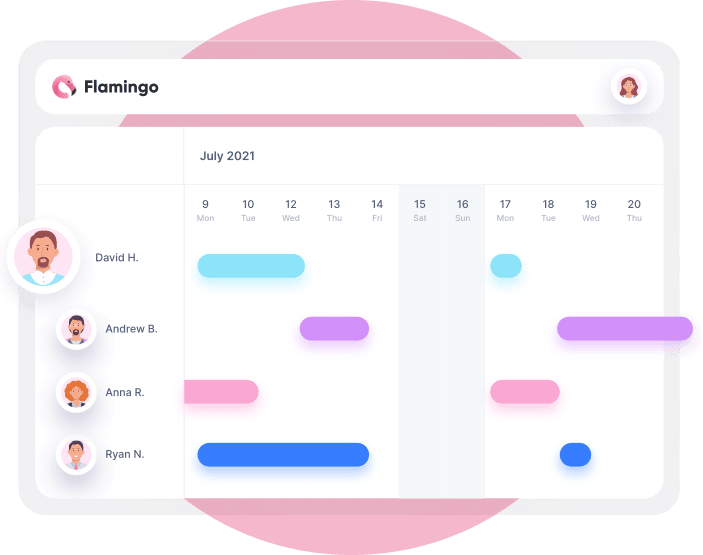
Flamingo is a leave management solution built for modern teams.
No more cluttered spreadsheets and manual data entry. Manage your entire team's leave, directly from Slack, and speed up your leave management workflow.
Learn more Sign Up FreeIn this page, we’ll break down all you need to know about leave laws in Sweden.
Read on to learn about employees’ rights in regards to paid time off/annual leave, sick leave, parental leave, national/public holidays, and more.
This page is intended for reference purposes only and does not constitute legal advice. Please see official government sources or consult a legal professional for actual legal advice.
Employees in Sweden are entitled to 25 days of paid annual leave in each leave year, which stretches from April 1 to March 31.
If an employee commenced work after the 31st of August during the leave year, they are entitled to just five days of annual leave for that year.
Employees have the entitlement to take at least four weeks of annual leave in the period of June to August, unless special reasons prevent them from being able to do so.
If an employee has more than 20 days of annual leave, they may carry over any unused annual leave at the end of the leave year to the following year.
Any days carried over must be used within five years of the leave year from which it was carried over.
Learn more about Use It or Lose It policies here.
Employees in Sweden are entitled to sick leave.
For the first 14 calendar days of sick leave, the employer pays 80% of the employee’s regular pay, on the condition that the sickness has been reported by the employee.
From day 15 onwards, the employer is not required to pay, and the employee can instead apply for sickness benefit from Försäkringskassan (Swedish social insurance).
Sweden has the following public holidays:
| Date | Holiday |
|---|---|
| January 1 | New Years Day |
| January 6 | Epiphany |
| Friday before Easter Sunday | Good Friday |
| March/April | Easter Sunday |
| Monday after Easter Sunday | Easter Monday |
| May 1 | International Worker’s Day (Labour Day) |
| 39 days after Easter Sunday | Ascension Day |
| 50 days after Easter | Pentecost Sunday |
| June 6 | Swedish National Day |
| Saturday between June 20 and 26 | Midsummers Day |
| Saturday between October 31 and November 6 | All Saints Day |
| December 25 | Christmas Day (Juldagen) |
| December 26 | Boxing Day (Annandag jul) |
Midsummer’s Eve, Christmas Eve and New Year’s Eve are often celebrated as holidays as well, and many workplaces provide a paid day off for these days, though they are not officially public holidays.
Employees get a paid day off for public holidays, but there is no law regarding additional pay for anyone who works on a public holiday.
Together, parents are entitled to a total of 480 days parental benefit, with an additional 180 days per child for multiple births (twins, triplets, etc).
240 days are allocated to each parent, but up to 150 days can be transferred from one parent to the other. 384 days must be used before the child’s fourth birthday, and the rest must be used before the child turns 12.
During the child’s first year, a maximum of 30 days can be taken at the same time (each parent taking leave on the same day).
The mother is entitled to 60 days of maternity leave prior to the expected birth, and the other parent can take 10 days in connection with the birth.
Parental benefits are not paid by the employer, but by Swedish social insurance.
Parental benefits also apply when adopting a child.
There is no law regarding bereavement leave in Sweden – it depends on individual employment contracts and collective agreements.
Generally, employers provide up to 10 days of paid leave for the death of a close relative, but this may vary from employer to employer.
What is Bereavement Leave? Click here to learn more.
https://www.forsakringskassan.se/english/for-employers/illness-and-injury/sick-employee-days-1-90

No more cluttered spreadsheets and manual data entry. Manage your entire team's leave, directly from Slack, and speed up your leave management workflow.
Learn more Sign Up Free